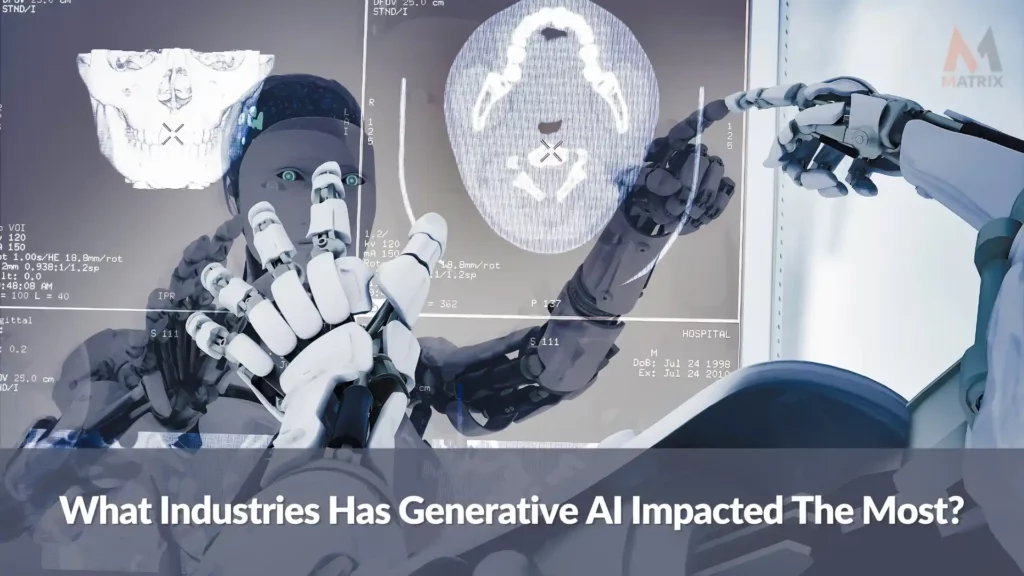Generative AI Businesses Impact
Learn How Generative AI Businesses Impacts Your Industry.
Generative AI has significantly impacted various aspects of business, transforming how organizations function and compete.
The CEO, a woman in her early 40s, stepped into the CMO’s office and asked how AI impacted their business. She expressed her excitement about the potential of AI and its ability to revolutionize their industry.
She shared an understanding of how AI can process and analyze vast amounts of data quickly and accurately—something that would have been near impossible before. She also discussed the benefits of predictive analytics and faster decision-making.

The CEO concluded by emphasizing the importance of leveraging AI to improve the overall accuracy, better understand complex problems, and facilitate more effective long-term planning.
I’d like to met with Matrix Marketing Group and learn how thy are applying AI. She said confidently. It’s clear that AI has the potential to benefit us greatly, and I want to make sure we are taking advantage of its capabilities.
The CMO nodded in agreement and added that they were already exploring ways to apply AI to their business. He was confident that Matrix Marketing Group could help them find ways to use AI even more effectively—something that would bring great value to their organization.
The CEO smiled and thanked the CMO for his insight before she left the office. It was obvious she had a strong interest in using AI to power the company forward, and it was equally evident that the CMO shared her enthusiasm. Together, they planned to meet with Matrix Marketing Group soon and take their business to the next level.

Here are some key areas where generative AI has made a difference:
- Content creation: AI can generate content for marketing materials, social media posts, and even draft news articles, freeing time for human employees to focus on higher-value tasks. This can lead to more efficient content creation and improved brand presence.
- Customer service: Chatbots and virtual assistants powered by generative AI can handle customer queries and complaints more effectively, reducing response times and improving customer satisfaction. These tools can help businesses scale their customer support efforts without increasing costs.
- Data analysis and insights: Generative AI can quickly analyze large amounts of data to identify patterns, trends, and correlations that may be hidden from human analysts. This can lead to more informed decision-making and better strategic planning.
- Product design and innovation: Generative AI can help businesses explore new design ideas and optimize existing products by rapidly generating and evaluating potential solutions. This can lead to more innovative product offerings and a more competitive market position.
- Personalization and recommendations: AI can analyze user behavior and preferences to generate personalized recommendations, enhancing customer engagement and driving sales. This can help businesses target their marketing efforts better and improve the overall customer experience.
- Automation of routine tasks: Generative AI can automate repetitive and time-consuming tasks, such as generating reports, creating schedules, or managing inventory. This can improve operational efficiency and allow employees to focus on more strategic work.
- Recruitment and talent management: AI can streamline recruitment by quickly evaluating candidate profiles, generating interview questions, and conducting initial screening interviews. This can lead to more efficient hiring processes and improved talent acquisition.
- Sales and lead generation: Generative AI can help businesses identify potential leads by analyzing data and generating targeted sales pitches, improving conversion rates and revenue generation.
- Risk management and decision support: AI can quickly analyze complex data sets to identify potential risks and opportunities, supporting better decision-making and proactive risk management.
- Training and education: Generative AI can create customized training materials and interactive learning experiences, enhancing employee skill development and overall organizational performance.
Generative AI has the potential to significantly impact various aspects of business operations, from content creation and customer service to product design and risk management.
By automating routine tasks and generating valuable insights, AI can help businesses stay competitive and agile in the ever-evolving business landscape.
What are the top 7 industries most impacted by AI?
AI has significantly impacted various industries, but some have experienced particularly transformative effects.

Here are the top 7 industries most impacted by AI:
- Healthcare: AI has revolutionized healthcare through improved diagnostics, personalized medicine, and drug discovery. Machine learning algorithms can analyze medical images, predict patient outcomes, and identify potential treatment plans. AI also aids in developing new drugs by simulating molecular interactions and streamlining clinical trials.
- Finance: AI has become integral to the finance industry, from algorithmic trading and risk management to fraud detection and customer service. Machine learning algorithms can analyze financial data to make investment decisions, optimize portfolios, and provide personalized financial advice. AI-powered chatbots can handle customer queries, enhancing user experience and customer satisfaction.
- Manufacturing: AI transforms manufacturing through automation, predictive maintenance, and supply chain optimization. Robots can perform complex tasks precisely, reducing human error and increasing efficiency. AI algorithms can predict equipment failures, minimizing downtime and maintenance costs. Additionally, AI helps optimize production planning and inventory management.
- Retail and E-commerce: AI plays a significant role in personalizing customer experiences, optimizing pricing strategies, and managing inventory. Machine learning algorithms can analyze consumer behavior to provide personalized recommendations, while AI chatbots assist customers with queries and support. AI also helps retailers make data-driven pricing, promotions, and inventory management decisions.
- Transportation and logistics: AI is revolutionizing transportation through autonomous vehicles, route optimization, and predictive analytics. Self-driving cars and trucks can increase road safety and efficiency, while AI-powered route optimization can minimize fuel consumption and delivery times. Predictive analytics can help companies anticipate demand and optimize fleet management.
- Energy and utilities: AI improves energy management, optimizes grid operations, and predicts equipment failures. AI can also predict equipment malfunctions, enabling proactive maintenance and reducing downtime. Machine learning algorithms can analyze consumption data to optimize energy distribution and identify potential efficiency improvements.
- Agriculture: AI transforms agriculture through precision farming, crop monitoring, and yield prediction. Machine learning algorithms can analyze satellite imagery and sensor data to optimize irrigation, fertilization, and pest control. AI can also help farmers monitor crop health, predict yields, and make data-driven decisions about planting and harvesting.

While these industries are currently experiencing the most significant impacts, AI continues to make inroads into other sectors, offering the potential for increased efficiency, cost savings, and improved decision-making across the board.
How can these industries leverage AI to improve sales?

Industries can leverage AI to improve sales, from personalized marketing and customer engagement to sales forecasting and process automation. Here are some strategies that can be applied across the mentioned industries:
- Personalization and targeted marketing: AI can analyze customer data, including browsing history, purchase patterns, and preferences, to create personalized marketing messages and product recommendations. This can increase customer engagement, drive conversions, and boost sales.
- Sales forecasting: AI algorithms can analyze historical sales data, market trends, and other relevant factors to predict future sales accurately. This helps businesses better plan inventory, manage cash flow, and allocate resources to optimize sales performance.
- Chatbots and virtual assistants: AI-powered chatbots can engage customers, answer their questions, and guide them through the purchasing process, leading to increased sales. These tools can also collect valuable customer feedback and data to refine marketing strategies and improve customer satisfaction.
- Lead scoring and prioritization: AI can help sales teams identify and prioritize leads based on their conversion likelihood. By analyzing customer data and interactions, AI can generate lead scores and help sales representatives focus on high-potential prospects, increasing the chances of successful sales.
- Price optimization: AI can analyze market data, customer preferences, and competitor pricing to develop optimal pricing strategies. Dynamic pricing models can adjust real-time prices based on supply and demand, maximizing revenue and profit margins.
- Sales process automation: AI can automate repetitive tasks within the sales process, such as data entry, follow-up emails, and appointment scheduling. This allows sales representatives to focus on building relationships and closing deals, improving overall sales efficiency.
- Cross-selling and upselling: AI can analyze customer data to identify opportunities for cross-selling and upselling. AI can recommend complementary products or services by understanding customer preferences and purchase histories, increasing average transaction values and overall sales.
- Enhanced customer experience: By using AI to provide personalized experiences, timely support, and relevant recommendations, businesses can build strong relationships with their customers. This increases the chances of repeat purchases and encourages customer loyalty and positive word-of-mouth, contributing to higher sales.
By implementing these strategies, industries can leverage AI to improve their sales performance, create a more customer-centric approach, and stay ahead of the competition.
How does AI eliminate waste in Marketing?

AI can help eliminate waste in marketing by increasing efficiency, enhancing targeting, and improving decision-making processes. Here are several ways AI can contribute to reducing waste in marketing:
- Improved targeting: AI can analyze customer data to identify the most relevant audience segments for specific marketing campaigns. By targeting the right audience, businesses can reduce wasted ad spend and increase the return on investment (ROI).
- Personalization: AI enables marketers to create personalized marketing messages and recommendations tailored to individual customers. This leads to more engaging content and higher conversion rates, minimizing wasted marketing efforts on irrelevant or generic content.
- Sentiment analysis: AI can analyze social media data, customer reviews, and other sources of feedback to understand customer sentiment toward a brand or product. This allows marketers to identify potential issues and adjust their strategies accordingly, reducing wasted efforts on ineffective campaigns.
- A/B testing and optimization: AI can automate the process of A/B testing and continuously optimize marketing campaigns based on real-time performance data. This helps marketers identify the most effective strategies and creatives, reducing waste on underperforming tactics.
- Predictive analytics: AI can use historical data to predict future customer behavior and market trends, allowing marketers to make data-driven decisions and allocate resources more effectively. This can minimize waste by focusing marketing efforts on high-potential opportunities and avoiding low-ROI initiatives.
- Content optimization: AI can analyze content performance data to identify the most effective types of content, topics, and formats for a specific audience. Marketers can reduce wasted time and resources on low-impact content by focusing on creating high-performing content.
- Marketing automation: AI can automate various marketing tasks, such as email marketing, social media posting, and lead nurturing. By automating these tasks, marketers can reduce manual efforts and human error, leading to more efficient marketing operations and reduced waste.
- Real-time analytics and insights: AI enables marketers to access real-time data and insights on campaign performance, customer behavior, and market trends. This allows them to make informed decisions and adjustments in real time, reducing waste by quickly pivoting away from ineffective strategies.
By leveraging AI in these ways, marketers can significantly reduce waste in their marketing efforts, leading to more efficient campaigns, better resource allocation, and improved overall results.
How is Matrix Marketing Group help with AI Digital Marketing Solutions?
Matrix Marketing Group is a specific company with AI marketing solutions related to AI. It is a data-driven and integrated marketing approach involving AI-powered tools and solutions.
Matrix Marketing Group helps businesses with AI marketing solutions in several ways:
- Data analysis and insights: Matrix Marketing Group helps businesses analyze large datasets to uncover valuable insights and trends that inform marketing strategies. AI can be used to process and analyze this data quickly and efficiently.
- Personalization: Leverage AI to develop personalized marketing campaigns based on customer data and preferences. This can lead to higher engagement rates and improved conversion rates.
- Marketing automation: Help businesses implement AI-powered marketing automation tools that streamline email marketing, social media management, and lead nurturing tasks. This can lead to more efficient marketing operations and reduced waste.
- Predictive analytics: Use AI to develop predictive models that forecast customer behavior, market trends, and campaign performance. This can help businesses make data-driven decisions and allocate resources more effectively.
- Content optimization: Matrix Marketing Group can leverage AI to analyze content performance and identify the most effective types of content, topics, and formats for a specific audience. This can help businesses create high-impact content that drives results.
- Programmatic advertising: Help businesses implement AI-powered programmatic advertising platforms that automate ad buying, placement, and optimization. This can lead to more efficient ad spending and improved campaign performance.
- Sentiment analysis and social listening: AI can monitor social media, customer reviews, and other sources of feedback to understand customer sentiment and adjust marketing strategies accordingly.
- A/B testing and optimization: Use AI to automate A/B testing and continuously optimize marketing campaigns based on real-time performance data. This can help businesses identify the most effective strategies and reduce waste on underperforming tactics.
By leveraging AI-powered tools and solutions, Matrix Marketing Group a top generative AI companies globally. They can help businesses improve their marketing performance, increase efficiency, and drive better results.
Conclusion
By leveraging AI-powered tools and solutions, Matrix Marketing Group can help businesses improve their marketing performance, increase efficiency, and drive better results.
By leveraging AI-powered tools and solutions, Matrix Marketing Group can help businesses improve their marketing performance, increase efficiency, and drive better results. We have seen generative AI examples, generative AI applications, and how does generative AI work. Let’s see how it works for you.
With the right combination of data analysis, personalization, automation, predictive analytics, content optimization, programmatic advertising, sentiment analysis and social listening, and A/B testing and optimization tactics.
Marketers can reduce campaign waste while driving higher engagement with improved conversion rates.
To maximize your potential for success in digital marketing strategies involving AI technology; consider enlisting the services of an experienced Matrix Marketing Group specializing in this field. Great research here from our friend at McKinsey generative AI.
Matrix Marketing Group has partnered with Microsoft, Google, and HubSpot to offer industry solutions that need AI and digital marketing solutions.
General FAQs
What is AI digital marketing?

AI digital marketing is an integrated and data-driven approach to marketing that utilizes AI-powered tools and solutions. It utilizes these powerful tools to analyze large datasets, develop personalized campaigns, automate email marketing and lead nurturing tasks, conduct predictive analytics, optimize content for target audiences, implement programmatic advertising platforms, monitor customer sentiment, and optimize campaigns through A/B testing. These strategies can help businesses improve their marketing performance, increase efficiency, and drive better results.
How can a Matrix Marketing Group help me with AI digital marketing?

A Matrix Marketing Group can provide specialized expertise using AI-powered tools to help you achieve your digital marketing goals. They can assist you in analyzing large datasets to uncover valuable insights and trends that inform your strategies; develop personalized campaigns based on customer data; implement automation tools that streamline email marketing and social media management; create predictive models to forecast customer behavior; optimize content for specific target audiences; set up programmatic advertising platforms; monitor customer sentiment via social listening; and continuously optimize your campaigns through A/B testing.
What are the main benefits of implementing an AI-driven approach to digital marketing?

There are numerous benefits to implementing an AI-driven approach to digital marketing, including improved accuracy and speed of analysis due to sophisticated algorithms; access to real-time performance data that enables more efficient decisions when allocating resources; improved quality of content due to automated optimization processes; enhanced personalization capabilities at scale due to segmentation based on individual consumer preferences; increased efficiencies associated with automation of tasks such as email marketing, social media management, and lead nurturing; improved insights into customer behavior via predictive analytics models; reduced waste through programmatic advertising capabilities.
What should I consider when enlisting the services of a Matrix Marketing Group specializing in this field?

When enlisting the services of a Matrix Marketing Group specializing in this field, it is important to consider the team’s experience in leveraging AI-powered solutions for digital marketers’ needs. You should also evaluate their familiarity with related technologies, including machine learning (ML), natural language processing (NLP), computer vision (CV), etc., as well as their ability to work collaboratively with your team across different departments such as IT, finance, sales & operations. Finally, ensure they have a track record of success working with other businesses on similar projects.

